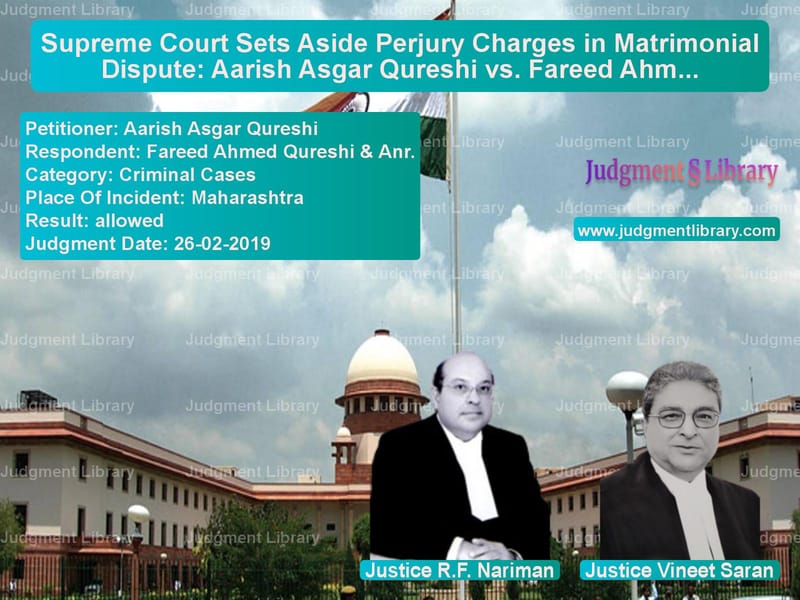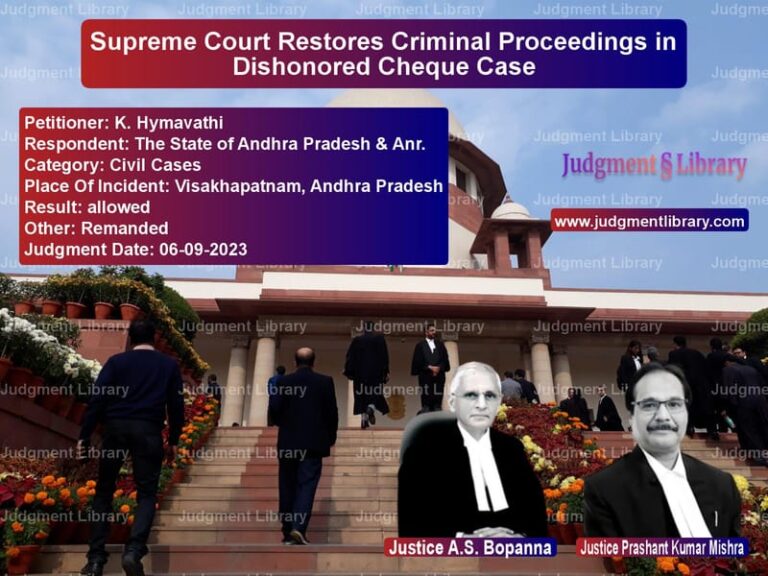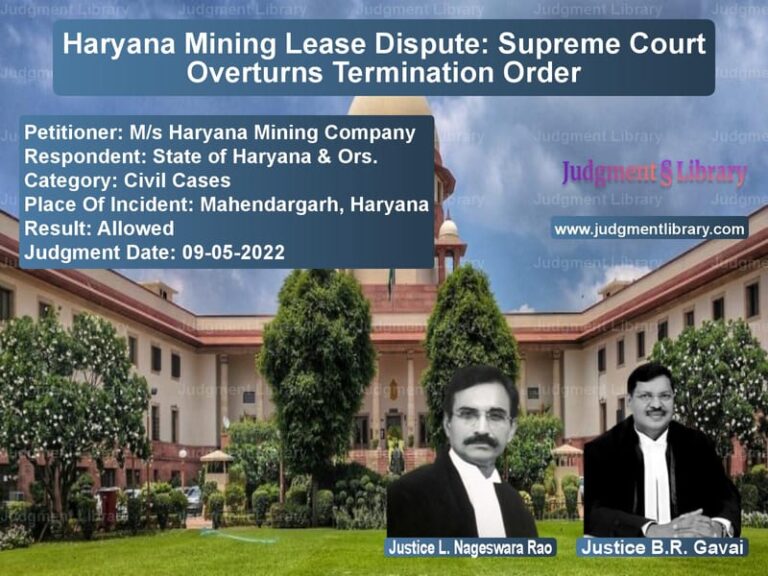Supreme Court Sets Aside Perjury Charges in Matrimonial Dispute: Aarish Asgar Qureshi vs. Fareed Ahmed Qureshi
The Supreme Court of India, in the case of Aarish Asgar Qureshi vs. Fareed Ahmed Qureshi, addressed a significant issue regarding the initiation of perjury proceedings in matrimonial disputes. The case revolved around allegations of false statements made in anticipatory bail applications, leading to a complaint under Section 340 of the Criminal Procedure Code (Cr.P.C.). The judgment clarifies the principles governing perjury proceedings and reaffirms the necessity of solid evidence before initiating prosecution for false statements.
Background of the Case
The case arose out of a matrimonial dispute between Aarish Asgar Qureshi (appellant) and his wife. During the course of the legal battle, the appellant filed an anticipatory bail application before the Sessions Court and later before the Bombay High Court. In the application, the appellant alleged that his wife had been involved in an extramarital affair and had been caught in a compromising position with another individual.
These statements were later contested by the wife’s family, who claimed that they were false and intended to mislead the court. The matter was escalated to the High Court, which, after examining the claims, concluded that there was a prima facie case for perjury under Section 340 Cr.P.C. and directed that an inquiry be conducted by the magistrate.
Key Legal Issues
The Supreme Court was tasked with determining:
- Whether the allegations made by the appellant in the anticipatory bail application constituted perjury.
- Whether the High Court was correct in directing perjury proceedings under Section 340 Cr.P.C.
- The legal principles governing perjury and false statements made during judicial proceedings.
Arguments of the Parties
Appellant’s Arguments
The appellant, through his counsel, argued that:
- The statements made in the anticipatory bail application were based on his understanding and belief at the time.
- The High Court wrongly relied on a preliminary police report, which itself was not conclusive.
- There was no clear evidence to prove that the statements made were intentionally false.
- The High Court failed to consider that perjury proceedings should be initiated only when the falsehood is established beyond doubt.
Respondent’s Arguments
The respondents countered that:
- The appellant’s statements were made with a deliberate intent to mislead the court.
- The investigating officer’s report clearly indicated that the statements were false.
- The High Court was justified in ordering an inquiry under Section 340 Cr.P.C. given the serious nature of the false allegations.
Supreme Court’s Observations
The Supreme Court carefully examined the law on perjury and laid down key principles that must be satisfied before initiating such proceedings.
1. Standard of Proof for Perjury
The Court emphasized that perjury proceedings should be initiated only when there is clear and unimpeachable evidence to establish that a false statement was made intentionally. It cited its previous rulings in Chajoo Ram vs. Radhey Shyam (1971) and Chandrapal Singh vs. Maharaj Singh (1982), reiterating that:
“Prosecution should be ordered when it is considered expedient in the interests of justice to punish the delinquent and not merely because there is some inaccuracy in the statement.”
2. Contradictory Statements Do Not Automatically Constitute Perjury
The Court noted that merely making contradictory statements in different proceedings does not automatically amount to perjury. For perjury to be established:
- The statement must be deliberately false.
- There must be conclusive evidence proving its falsity.
- The false statement must have been made with the intention of misleading the court.
In this case, the Supreme Court found that the High Court did not analyze whether the appellant’s statements were intentionally false or merely a matter of perspective.
3. Preliminary Police Reports Are Not Conclusive
The Supreme Court criticized the High Court’s reliance on a preliminary police report to determine the falsity of the appellant’s statements. It held that:
“A preliminary investigation report filed two days after the FIR cannot be regarded as unimpeachable evidence against the statements made in the anticipatory bail application.”
4. High Court’s Failure to Assess Expediency
Under Section 340 Cr.P.C., before directing perjury proceedings, the court must determine whether such prosecution is expedient in the interests of justice. The Supreme Court observed that the High Court had failed to assess this crucial factor.
Final Judgment
The Supreme Court ruled in favor of the appellant, setting aside the High Court’s order and quashing the perjury proceedings. The Court held:
“The High Court erred in initiating proceedings under Section 340 Cr.P.C. without first establishing that the statements made were deliberately false and intended to mislead the court. The appellant’s statements in the anticipatory bail application cannot be said to be conclusively false based on a preliminary police report.”
Key Takeaways
- Strict Standard for Perjury: Courts must ensure that perjury proceedings are initiated only in cases where falsehood is clearly established.
- Contradictory Statements Are Not Always Perjury: The mere existence of contradictory statements does not automatically lead to perjury charges.
- Reliance on Preliminary Reports: Courts should be cautious while relying on preliminary police reports, as they are not conclusive proof of falsehood.
- Expediency Test: Before initiating perjury proceedings, courts must determine whether doing so serves the interests of justice.
Conclusion
The Supreme Court’s decision in Aarish Asgar Qureshi vs. Fareed Ahmed Qureshi is a landmark ruling reinforcing the need for caution and due diligence before initiating perjury proceedings. The ruling underscores the principle that courts must ensure strong evidence exists before criminal prosecution is triggered for alleged false statements. This judgment serves as a guiding precedent for future cases involving perjury claims in matrimonial and other disputes.
Petitioner Name: Aarish Asgar Qureshi.Respondent Name: Fareed Ahmed Qureshi & Anr..Judgment By: Justice R.F. Nariman, Justice Vineet Saran.Place Of Incident: Maharashtra.Judgment Date: 26-02-2019.
Don’t miss out on the full details! Download the complete judgment in PDF format below and gain valuable insights instantly!
Download Judgment: Aarish Asgar Qureshi vs Fareed Ahmed Qureshi Supreme Court of India Judgment Dated 26-02-2019.pdf
Direct Downlaod Judgment: Direct downlaod this Judgment
See all petitions in Fraud and Forgery
See all petitions in Bail and Anticipatory Bail
See all petitions in Custodial Deaths and Police Misconduct
See all petitions in Judgment by Rohinton Fali Nariman
See all petitions in Judgment by Vineet Saran
See all petitions in allowed
See all petitions in supreme court of India judgments February 2019
See all petitions in 2019 judgments
See all posts in Criminal Cases Category
See all allowed petitions in Criminal Cases Category
See all Dismissed petitions in Criminal Cases Category
See all partially allowed petitions in Criminal Cases Category







